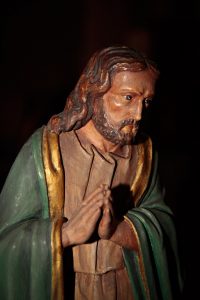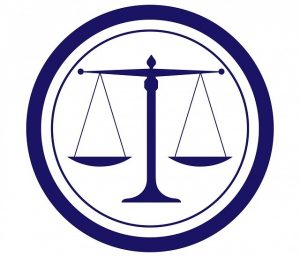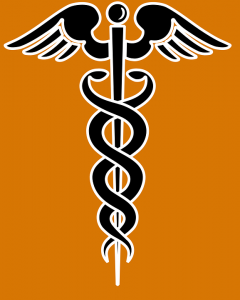It will strike some readers as “heresy” for members of one of the mainstream Christian denominations (in this case, the Episcopal Church) to question several tenets of a major document of the church – especially when the questioning comes during the major season of Christmas. For other readers, though – perhaps those searching in a spiritual sense, perhaps those who find certain aspects of Christianity appealing but cannot believe as real what they view as “mythology” – this discussion may be helpful, if not liberating.
One of the principle documents of the Church is the Nicene Creed (text below), which was adopted at a church Council in 325 CE. This Creed and the shorter Apostles’ Creed came about through long years of turmoil, analysis, discussion and even violence in the Church.  So-called “orthodox” (small “o”) Christians – “orthodox” from the Greek meaning “correct opinion” – are expected to believe the tenets of the Creeds literally – that God is a heavenly Father, that Jesus was the Christ or Messiah (“anointed one”), that Jesus was the only son of that Father God, that Jesus will come again in glory, etc. Perhaps the only fact-based statement in the Creed is this: Jesus “was crucified under Pontius Pilate; he suffered death and was buried.”
So-called “orthodox” (small “o”) Christians – “orthodox” from the Greek meaning “correct opinion” – are expected to believe the tenets of the Creeds literally – that God is a heavenly Father, that Jesus was the Christ or Messiah (“anointed one”), that Jesus was the only son of that Father God, that Jesus will come again in glory, etc. Perhaps the only fact-based statement in the Creed is this: Jesus “was crucified under Pontius Pilate; he suffered death and was buried.”
For some of us in 21st-century America (or the West in general), it is impossible to believe these things literally. Thus in many ways the Christian faith as it has come down to us is hard to swallow; we are basically being asked to suspend our rational, science-based beliefs and cling to theological myths. (There is nothing inherently wrong with myths, but that is a subject for another day.) While Fundamentalist Christians hold that one cannot be a “true” Christian without believing that these creedal tenets are factually and literally true, many of the rest of us cannot so believe.
We need to stretch ourselves pretty thin, and far from the Creeds, to get back to the Jewish man Jesus, on which this entire religion is supposed to be based. Where in the Creeds is the Jesus who preached love, including love of enemies? (Matt. 5:44) Where is the Jesus who healed those who were sick (Luke 9:6) or even raised the dead? (John 11:17-44) Where is the Jesus who taught challenging parables? Where is the Jesus who loved little children (Mark 10:13-16) and upheld the dignity of women? (Matt. 15:22-28)
The absence of information about Jesus is not the only unfortunate limitation of the Creeds as fashioned by ancient theologians and church fathers. Another drawback, which can be addressed helpfully using findings from paranormal research, is the assertion that Christ is coming “to judge the living and the dead.”  Arthur Conan Doyle, for instance, discovered that there is no final judgment per se from a God apart from ourselves; this and many other truths were delivered during séances after his physical death and recorded for us in Cooke’s Book of the Beyond (see, e.g., p. 168). This fact of self-judgment is further discerned through the work of Jeffrey Long and his associates, who have studied nearly 5,000 people who have had near-death experiences (NDEs). Over 22 percent of people who have had an NDE experienced a “life review” of their past lives; in these reviews, over 20 percent of survivors judged themselves – they were not judged by another being. These people witnessed the effect of their life choices and decisions, and many further experienced the actual feelings of others with whom they had interacted years earlier (Long, Afterlife, 14, 113).
Arthur Conan Doyle, for instance, discovered that there is no final judgment per se from a God apart from ourselves; this and many other truths were delivered during séances after his physical death and recorded for us in Cooke’s Book of the Beyond (see, e.g., p. 168). This fact of self-judgment is further discerned through the work of Jeffrey Long and his associates, who have studied nearly 5,000 people who have had near-death experiences (NDEs). Over 22 percent of people who have had an NDE experienced a “life review” of their past lives; in these reviews, over 20 percent of survivors judged themselves – they were not judged by another being. These people witnessed the effect of their life choices and decisions, and many further experienced the actual feelings of others with whom they had interacted years earlier (Long, Afterlife, 14, 113).
The issue of self-judgment challenges the Christian belief of God as Almighty Judge: in the words of postmortem Doyle, “Over here [in the afterlife] we do not judge anyone; with broader vision we do not see a God vindictive or cruel, but an infinite love, a divine and compassionate intelligence” (Cooke, Book of the Beyond, 225). Is not this insight closer to the life and example of Jesus than many of the tenets of the Creeds?
Other assertions of the Creeds can also be questioned – the notion of the resurrection, for instance, and the suggestion that the ancient Jewish prophets predicted the Christian “Holy Spirit” – but, while some of us have trouble reciting the Creeds in church – asserting “we believe” when we really do not – we still want to hold onto the best of Christian precepts and see Jesus as a primary model for our lives. What might be the way forward?
Conclusion
In this season where Christians throughout the world celebrate the birth of the Jew Jesus, perhaps we can resolve to think more about the life, teaching and wisdom of that man than the legends and myths that have grown up around him for the past 2,000 years. (Can we even take the bold step, as some of our congregations do periodically, to omit the recitation of the Creed during the liturgy, at least part of the time?) Here are a few thoughts as to what Jesus might be able to offer us in the 21st century:
- Wisdom about the Kingdom of God that he preached (however we might define God) as a realm of justice, mercy, love and peace.

- An example of a life lived in service to others, inclusively and often in defiance of the surrounding culture.
- An example of courage, the impulse to question oppressive authorities even to the point of unjust execution.
- A model of healing, perhaps in the mode of ancient deities such as Asklepios and Hygeia.
 A man like Jesus who had possibly studied with wise sages in Eastern lands could well have possessed high-level skills and gifts for treating a wide range of ailments.
A man like Jesus who had possibly studied with wise sages in Eastern lands could well have possessed high-level skills and gifts for treating a wide range of ailments. - The example of a man who was so far advanced that, after physical death, he may have been able to appear to his closest friends and converse with them.
Finally, two creedal assertions do have support if taken metaphorically and considered from the perspective of paranormal research:
- “His Kingdom will have no end.” Paranormal evidence demonstrates that there is no beginning and no end to existence. (The paranormal evidence does not attribute this eternal quality necessarily to Jesus the Christ, however.)
- “The life of the world to come.” Similarly, paranormal evidence shows that all souls ultimately enjoy an everlasting “world;” there is no death, and there are no dead.
Modern Christians do not have to believe every tenet of the Creeds in order to be part of the “Jesus movement” or to live good “Christian” lives. We would do very well, however, to learn more about the history of the Creeds and attempt to sort out, as much as possible, fact from mythology and metaphor.
The Text of the Nicene Creed
We believe in one God,
the Father, the Almighty,
maker of heaven and earth,
of all that is, seen and unseen.
We believe in one Lord, Jesus Christ,
the only Son of God,
eternally begotten of the Father,
God from God, Light from Light,
true God from true God,
begotten, not made,
of one Being with the Father.
Through him all things were made.
For us and for our salvation
he came down from heaven:
by the power of the Holy Spirit
he became incarnate from the Virgin Mary,
and was made man.
For our sake he was crucified under Pontius Pilate;
he suffered death and was buried.
On the third day he rose again
in accordance with the Scriptures;
he ascended into heaven
and is seated at the right hand of the Father.
He will come again in glory to judge the living and the dead,
and his kingdom will have no end.
We believe in the Holy Spirit, the Lord, the giver of life,
who proceeds from the Father and the Son.
With the Father and the Son he is worshiped and glorified.
He has spoken through the Prophets.
We believe in one holy catholic and apostolic Church.
We acknowledge one baptism for the forgiveness of sins.
We look for the resurrection of the dead,
and the life of the world to come. Amen.
Resources
Abrahamsen, Valerie A. Paranormal: A New Testament Scholar Looks at the Afterlife. Self-published 2015; printed by Shires Press, Manchester Center, Vermont.
Butler, Tom and Lisa Butler. There is No Death and There are No Dead. Reno, NV: AA-EVP Publishing, 2008.
Cooke, Ivan. Arthur Conan Doyle’s Book of the Beyond. New Lands, England: The White Eagle Publishing Trust, 2006.
Long, Jeffrey, with Paul Perry. Evidence of the Afterlife: The Science of Near-Death Experiences. New York: HarperCollins Publishers, 2010.
